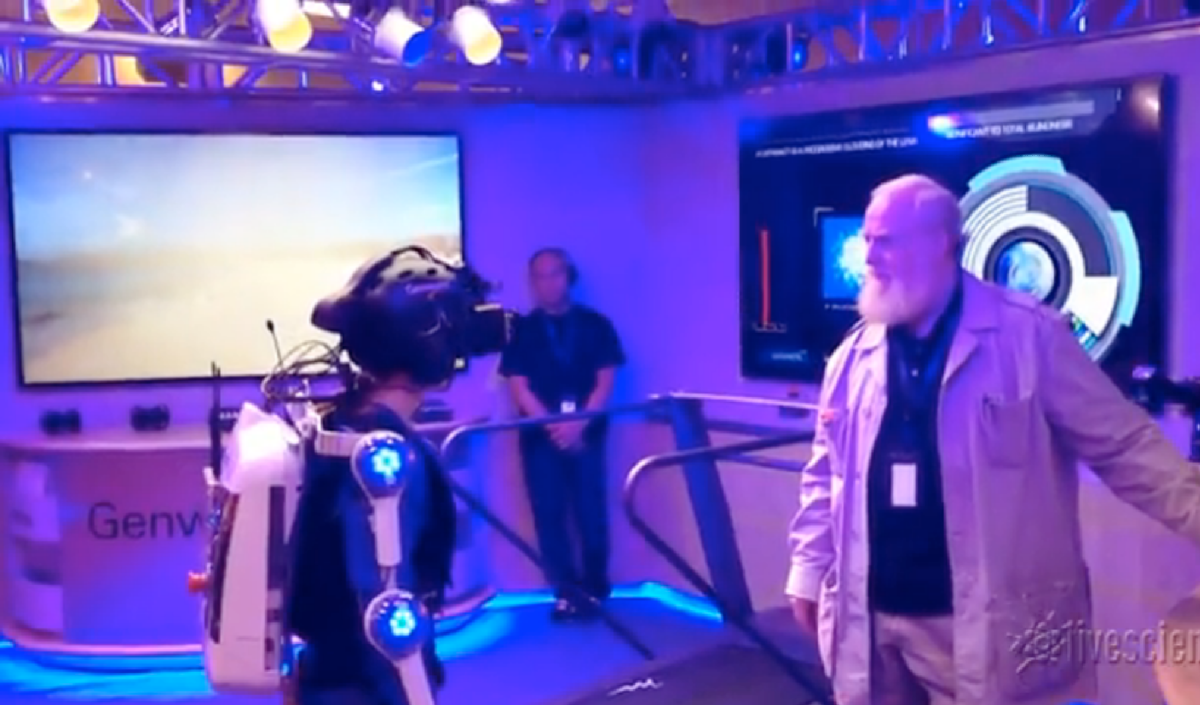The R70i robotic aging suit looks like the futuristic, bizarre armor that a video game hero might find in a post-apocalyptic wasteland, except that it doesn’t provide an escapist power fantasy. Quite the opposite, in fact. The R70i attempts to simulate aging several decades by evoking the experience of having cataracts, or glaucoma, or tinnitus, or a hip injury, and so on.
Applied Minds, the company that created the suit, hopes to increase awareness about what it feels like to grow older. One potential use for the device would be as a teaching tool for people who work with the elderly, since they might benefit from a more hands-on understanding of the physical changes that often happen in old age. Bran Ferren, the company’s co-founder and chief creative officer, told Live Science that the suit is “designed to create empathy and understanding of what these issues are.”
Laura Geggel, the Live Science reporter who tried on the suit in the video above, wrote afterwards that she “vowed to stop mindlessly walking so fast with my older relatives.” But do empathy simulators like the R70i actually inspire people to make long-term, significant changes in how they treat people who are different from them?
I don’t have a concrete answer to that question, but it’s one that I’ve asked myself a lot since “empathy games” and “empathy sims” have become so popular, particularly in the video game space and now, increasingly, in the VR and technology space. Just yesterday, I received a press release about a VR empathy simulator called The Migraine Experience, which was created by Exedrin (as in, the migraine relief drug); that game also claimed to “foster empathy.” As a person who has gotten debilitating migraines since the age of 12, I thought the VR game sounded like a very strange way of fostering “empathy.” Do I need to make my peers literally dizzy and nauseated (perhaps even to the point of actual vomit, since this is a VR game) before they truly understand what I go through? That seems simultaneously too far and not far enough when it comes to “understanding.”
The idea of literally “walking in someone else’s shoes” appeals to us fundamentally as humans, I believe. But I’m not sure you have to strap on a pair of literal shoes to do it. In my own experiences, I think “empathy sims” work a lot better when there’s a humanizing, personal element involved. Experiencing a facsimile might feel powerful in the moment, but for me, those types of exercises don’t stick with me in the long term. What sticks with me tends to be a personal story told by someone about their experiences. That can be something that I remember for a lifetime, which truly changes my perspective on what life might be like in someone else’s shoes.
There are many games that describe a personal experience of this kind, but many of their creators find the term “empathy game” to be unnecessarily reductive. It does seem as though “empathy” has become a corporate buzzword of sorts, and that’s to its detriment. I think a great way to improve a tool like the R70i would be to pair it with some presentations by elderly folks who’ve experienced the issues that it attempts to replicate; that would add a humanizing element, and also really drill home for people that these experiences aren’t like a hat that you can take on and off.
(via Live Science)
—The Mary Sue has a strict comment policy that forbids, but is not limited to, personal insults toward anyone, hate speech, and trolling.—
Follow The Mary Sue on Twitter, Facebook, Tumblr, Pinterest, & Google+.









Published: Apr 7, 2016 06:14 pm